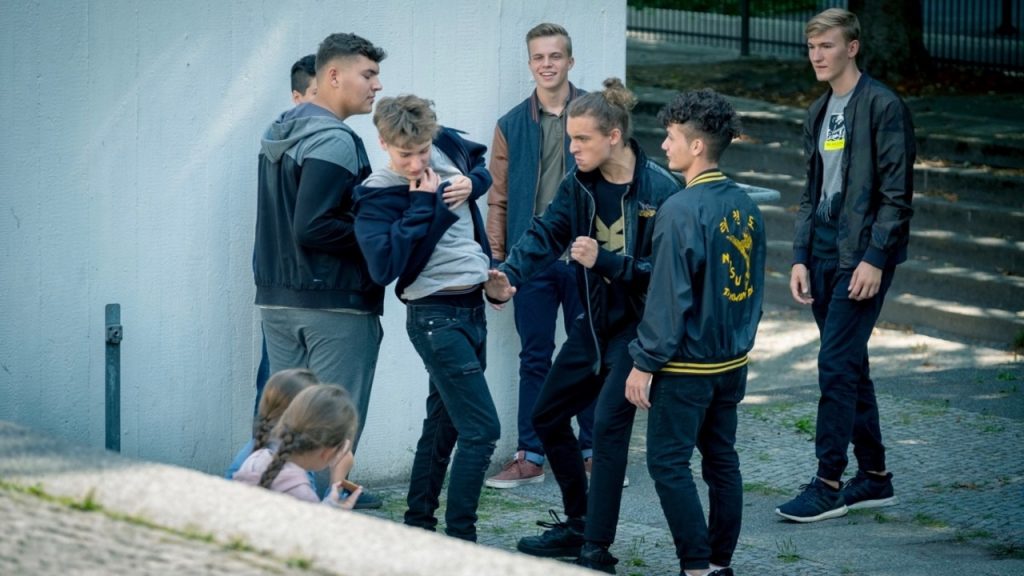Daniel Jacobson reviews the story of a Jewish high school student driven to attack two of his Muslim classmates.
The Unword is the newest, surprisingly entertaining, comedic movie by German filmmaker, Leo Khasin, that tells the story of Max, a Jewish high school student who, in a satire of the Israel-Palestine conflict, has been driven to attack two of his Muslim classmates by their rabid antisemitism. I say a satire, but it is far more allegorical than that. Consequently, agreeing to review this film and, therefore, wade publicly into the Israel-Palestine debate may be an astonishingly silly thing to do. But fuck it, here goes nothing.
The first thing to mention about The Unword is that it is overtly pro-Israel, even from my perspective. Max, who narrates much of the film, is sensitive, reasonable, and only acts in self-defence, whereas Karim, one of the Muslim students, is an aggressive, conspiracy-theory-spouting, Holocaust-denying bully. Despite the film revolving around a teacher-parent conference following the attack, only the Jewish parents are present for at least two-thirds of the film, which represents either the refusal of Palestinian leaders to even consider peace (if you are pro-Israel) or the reluctance of Palestinian leaders to engage with a one-sided, pre-determined negotiation process (if you are not).
I would argue though that there is a nugget of truth within The Unword, but this comes not from Max, despite the film following his perspective, nor from the Muslim students, even though their situations feel more interesting. Instead, it comes courtesy of Annika, their naïve, well-meaning teacher who believes that she can sort everything out. (Incidentally, Annika is played by Anna Bruggemann, the screenwriter of the wonderful adaptation of Deborah Kerr’s When Hitler Stole Pink Rabbit, which won Best Film at the UK Jewish Film Festival last year).
The film opens with Annika placing Israeli and Palestinian flags into platters of falafel and gefilte fish. Before long though, her optimism is dashed as we find her crying and hyperventilating in the corner, having realised the godforsaken mess she has waded into. Annika represents what happens when a layperson really tries to delve into the Israel-Palestine conflict and should be by far the most empathetic character in the film.

Admittedly, it may be slightly unfair to focus entirely on the Israel-Palestine conflict, as The Unword, more ostensibly, is attempting to give an example of what antisemitism continues to look like in 2021. This antisemitism encapsulates a variety of ancient tropes about Jews: the world’s wealth is controlled by the Rothschilds; the Jews control the media and foment unrest; the blood libel – which, absurdly, is still shared by both the left and right (that a liberal friend once asked me if Jews really use the blood of Christian children to make bread still retains a shred of perplexing comedy). However, it felt like the power of these statements were somewhat undermined by placing them in the context of geopolitics.
One particularly interesting aspect of The Unword is how it displays abhorrent anti-Muslim racism and antisemitism in Germany, a country that is attempting to capitalise on its status as a society of tolerance and equality. This is represented by Direktor Stege, the headmaster, who lauds the school’s zero-tolerance of racism, yet has let this conflict fester. However, in TV shows like Unorthodox, and even films at this festival like Sublet, Germany is portrayed as a kind of liberal utopia, and the juxtaposition of these two portrayals is intriguing. Incidentally, in the film’s final moments we learn that, at least from the perspective of an increasing number of Germans, whether you are Muslim or Jewish it doesn’t especially matter – you’re still seen as a foreigner.
I do think that The Unword offers some inconvenient truths, not so much about the Israel-Palestine conflict itself, but certainly about the discourse surrounding it, and the antisemitism which still rages throughout Germany. One day, I hope that it will be possible to have a film, or indeed a discussion, of antisemitism without Israel being mentioned. However, in the meantime, maybe we just need to do more hyperventilating.




